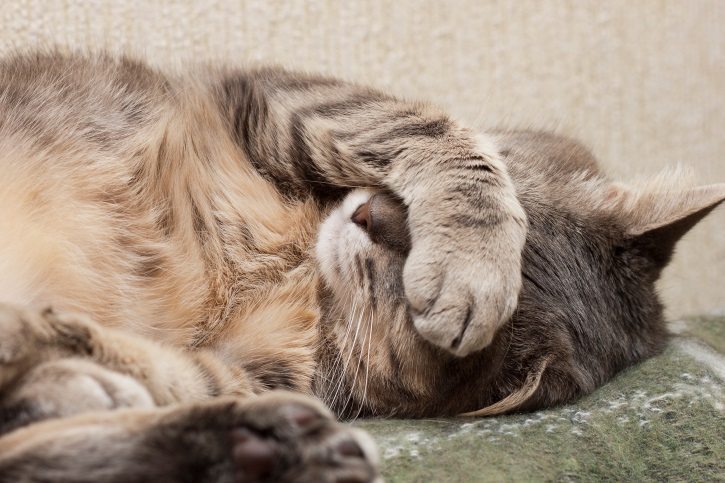There are some common health problems in cats that you can keep an eye out for whether you are taking home your first kitten or beginning to work with cats at a shelter or in veterinarian’s office. Knowing what the common health problems in cats are will give you an advantage in treating them.
Common Cat Health Problems
Fleas
Fleas are fairly common, but are easily preventable. Some cats can have very serious flea allergies so it is not something to take lightly.
Symptoms: Scratching and visible flea dust when you brush your cat.
Bring your cat to the vet to get medication or a prescription flea collar.
Worms
There are a couple different types of worms that cats are inclined to attract. These include tapeworms and roundworms.
Symptoms: Both parasites have the same basic symptoms of vomiting, losing weight and diarrhea.
Feline Immunodeficiency Virus
This is a very serious disease that is comparable to the human immunodeficiency virus (HIV) in that it impacts the cat’s ability to have a regular immune response to infections and viruses. FIV is highly contagious and cats are usually about 5 years old when they contract FIV. It is estimated that 2.5 to 4.4% of all cats in the world are infected. Get your kitten vaccinated right away. “Cats who spend time outdoors are at much higher risk of contracting serious infectious diseases (FIV, Feline Leukemia, Heartworm disease, etc.),” says Dr. Heather Loesner, an ER Veterinarian.
Symptoms: refusal to eat or drink, not moving much, fever, and enlarged lymph nodes.
Plant Poisoning
There are several species of plants that are seen as poisonous to cats, and unfortunately, cats love to chew on leaves. When you have a cat in your home it is best to not have any plants in your home or to hang them from the ceiling where your cat could never get to them. The ASPCA has an extensive list of plants that are toxic and a list of plants that are non-toxic to cats.
Symptoms: Scratching, redness, swelling, irritation, drooling, difficulty breathing, diarrhea, vomiting, excessive urination, excessive drinking, an irregular heartbeat, fast heartbeat, and/or slow heartbeat.
If you don’t know what kind of plant it is bring it with you. Go to the emergency vet’s right away. You can also call the Pet Poison Helpline at 1-855-213-6680.
Upper Respiratory Infections
This is one of the most common infections that cats get, and it can be very irritating to the cat. This infection is caused by bacteria and 90% of all cases are caused by the herpes virus and calicivirus.
Symptoms: discharge from nose or eyes, swollen eyes, nasal congestion, sneezing, mouth ulcers, refusal to eat or drink, fever, sluggishness, squinting, and/or enlarged lymph nodes.
Feline Gingivitis
This is very much like gingivitis in human beings. This is the beginning stage of gum disease where bacteria gets stuck below the gum line and deteriorates causing bacteria to form.
Symptoms: difficulty eating, red gums, receding gum line, drooling, bad breath, bleeding gums, and/or a reluctance to eat.
Urinary Tract Infections
A urinary tract infection or UTI is an infection in your cat’s urethra and bladder.
Symptoms: Not urinating in the litter box or a presence of blood in the urine
Kidney Disease
This is a very serious disease. Older cats die from kidney disease quite often. There can be many different causes for this including stress, poor nutrition, infection, or poisoning.
Symptoms: bad breath, mouth ulcers, stumbling, dehydrated, weight loss, a decrease in appetite, vomiting, lethargy, diarrhea, change in how much water your cat drinks, avoiding the litter box, and/or bloody or cloudy urine.
Thyroid
Hyperthyroidism (thyrotoxicosis) is a disorder that affects multiple systems in the body due to an increase in the T3 and T4 hormones. In this disease the thyroid gland is enlarged but non-cancerous.
Symptoms: weight loss, increased appetite, restlessness, unkempt fur, fast heart rate, increased drinking, vomiting, diarrhea, difficulty breathing, lethargy, fever, lumps in the neck
In any of these cases (except maybe hairballs), if you notice any of these symptoms, bring your cat to the emergency vet hospital right away or call your veterinarian.
Photo: Thinkstock










